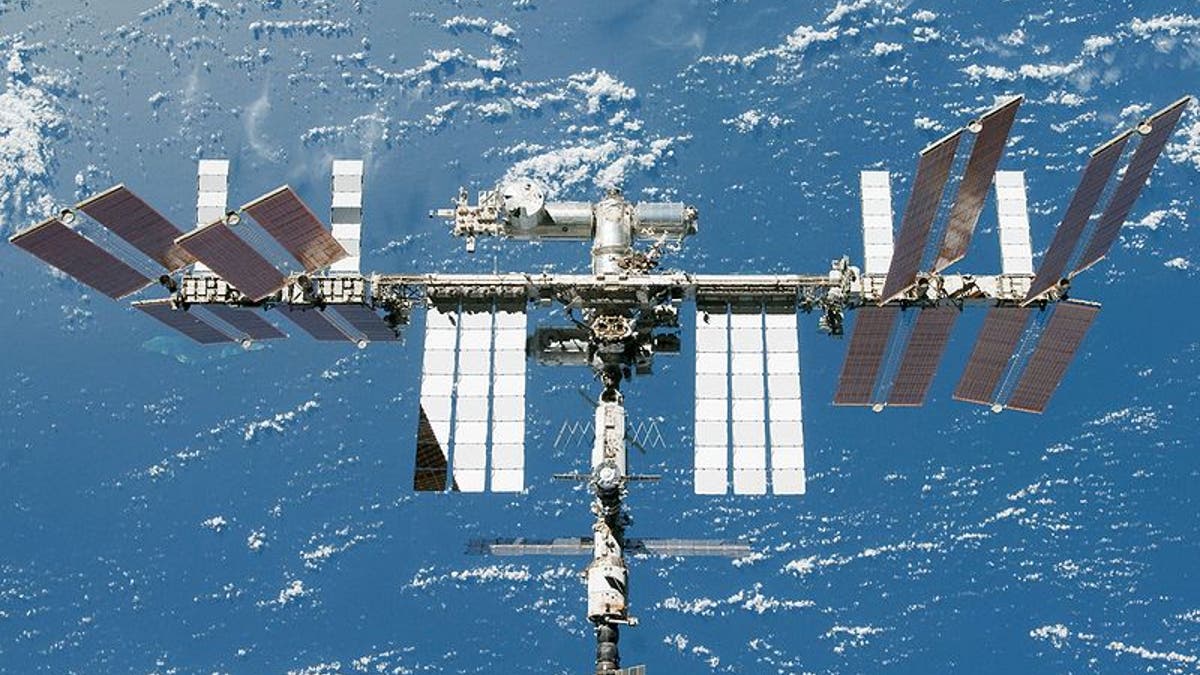
(NASA)
MOSCOW – NASA has scuttled the shuttles -- and now science may pay the price.
With the end of the storied space shuttle program, NASA is forced to rely on Russian spacecraft to operate the International Space Station. The recent crash of a Russian spaceship in the remote reaches of Siberia underscores the risk of that policy decision: A problem with Russia's fleet may force NASA to abandon the station as soon as November.
"If we have to de-man the ISS, we certainly have a safe way to do that," Michael Suffredini, NASA's space station program manager, said in a press conference Monday. "We're focused on keeping the crew safe. Our next focus is on keeping the ISS manned."
But if Russian Soyuz rockets remain grounded beyond mid-November, there will be no way to launch new crews before the current residents are supposed to leave.
A joint board of the world’s space agencies can operate the orbiting science project indefinitely without astronauts on board, he said. "We prefer not to operate without crew on board for an extended period of time."
"We'll try to prevent that if we can," he added.
There are currently six astronauts aboard the ISS, in orbit 220 miles above the Earth: Americans Michael Fossum and Ronald Garan; Russians Andrei Borisenko, Alexander Samokuyayev and Sergei Volkov; and Satoshi Furukawa of Japan. The crew is not presently in any danger, and they'll be staying there just a bit longer.
Russia on Monday delayed the return to Earth of three astronauts. The RIA news agency said those members of the crew would now return to Earth around Sept. 16 instead of Sept. 8 and new crew members would blast off in late October or early November instead of on Sept. 22.
"The crew on orbit is doing very well," Suffredini said. But if the Russians are unable to send up a new crew in that time frame, they will consider autonomous operations.
"If for any reason we will not be able to deliver the crew before the end of November, we will need to review all possibilities including leaving the station unmanned," Alexei Krasnov, an official in charge of manned flights at Roskosmos, was quoted as saying by Interfax.
The space agency hasn't considered de-manning the ISS since the Columbia disaster in the 80s.
"Logistically, we can support [operations] almost forever, but eventually if we don't see the Soyuz spacecraft, we'll probably be going to unmanned ops before the end of the year," Suffredini told Spaceflight Now last week.
The International Space Station, which serves as a research laboratory, has been permanently manned for more than a decade.
Russian officials made worldwide headlines in July with a controversial comment about de-orbiting the space station in 2020 -- comments the space agency backpedaled from a day later. Autonomous operation is a very real possibility, however.
State news agency RIA Novosti quoted Alexander Borisov, head of the Choisky region in Russia's Altai province, as saying pieces of the craft crashed and fell in his area some 1,500 kilometers (900 miles) northeast of the launch site, following the launch attempt August 24.
"The explosion was so strong that for 100 kilometers (60 miles) glass almost flew out of the windows," he was quoted as saying. There were no reports of casualties.
Roscosmos said the third stage of the rocket firing the ship into space failed a few minutes into the launch. The ship was carrying more than 2.5 tons of supplies, including oxygen, food and fuel. It was the 44th Progress to launch to the International Space Station.
An investigation into the cargo ship accident is under way. Krasnov said Roskosmos would carry out one or two test launches before sending the new crew into space. The recently appointed Russian team is "uniquely qualified" to resolve the anomaly that brought down the cargo supply ship, Suffredini said. But it may take a while to resolve the cause of the problem, he admitted.
The rockets which carry Progress cargo ships and Soyuz manned spacecraft have the same type of engines.
Late this year, commercial company SpaceX in California plans to launch its own rocket and supply ship to the space station, something NASA encourages. But a smaller, three-man crew on board the space station may require special training for the SpaceX docking.
"We haven't gotten that far" yet in planning, Suffredini admitted.
The space agency says supplies for the crew are not an issue at present, though even clothing could start to become a problem. Could astronauts end up wearing clothes they hadn't planned on rewearing? Probably not, Suffredini said.
"There may be one or two things we have to borrow" from the Russians, he said. But logistics are well planned out, a NASA spokeswoman confirmed.
"The supplies aboard the space station are actually pretty fat" after the resupply mission by space shuttle Atlantis in July, NASA spokeswoman Kelly Humphries said from Houston.
"So we don't anticipate any immediate impact to the crew."
News wires contributed to this story.
